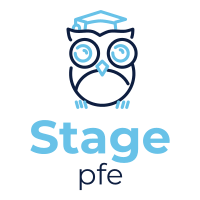
Power of attorney is an essential document if a person is left incapacitated or physically left incapable of making decisions for their person. The document is a legal authorization or designation to another individual to perform or act on their behalf.
[bb_toc content=”][/bb_toc]
Power Of Attorney Definition & Meaning
Power of attorney is a legally enforceable and binding document that allows an individual to appoint someone to manage their land property, medical, and financial affairs and responsibilities.
In this case, a person appoints an agent or an attorney-in-fact to act on behalf of the individual imploring the aid of the document.
What Is The Power Of Attorney?
Power of attorney or POA provides a person or person with special powers for definite activities like closing the sale of a real estate property, or the power is general, giving temporary or permanent authority over actions and decisions for an individual. The person to carry out the power of attorney to act on a person’s behalf is the agent or attorney-in-fact with the ability and rights to take any action permissible in the document, presenting the form, letter, or record to act. The principal or the person incapable of acting due to health problems, illness, or disability must select a power of attorney that they can trust to handle affairs, like family members, with the document obtainable online or through a lawyer.
10 Types of Power of Attorney
Business Power of Attorney
The business power of attorney is a legal form that authorizes an individual to act for a business. The document contains the information regarding the scenarios, events, or transactions that require the individual with power of attorney instead of giving a general power of attorney, causing them to act as they will. Business power of attorney enables an agent to sell an asset or liability, access financial resources, print checks, acquire services, or pay fees.
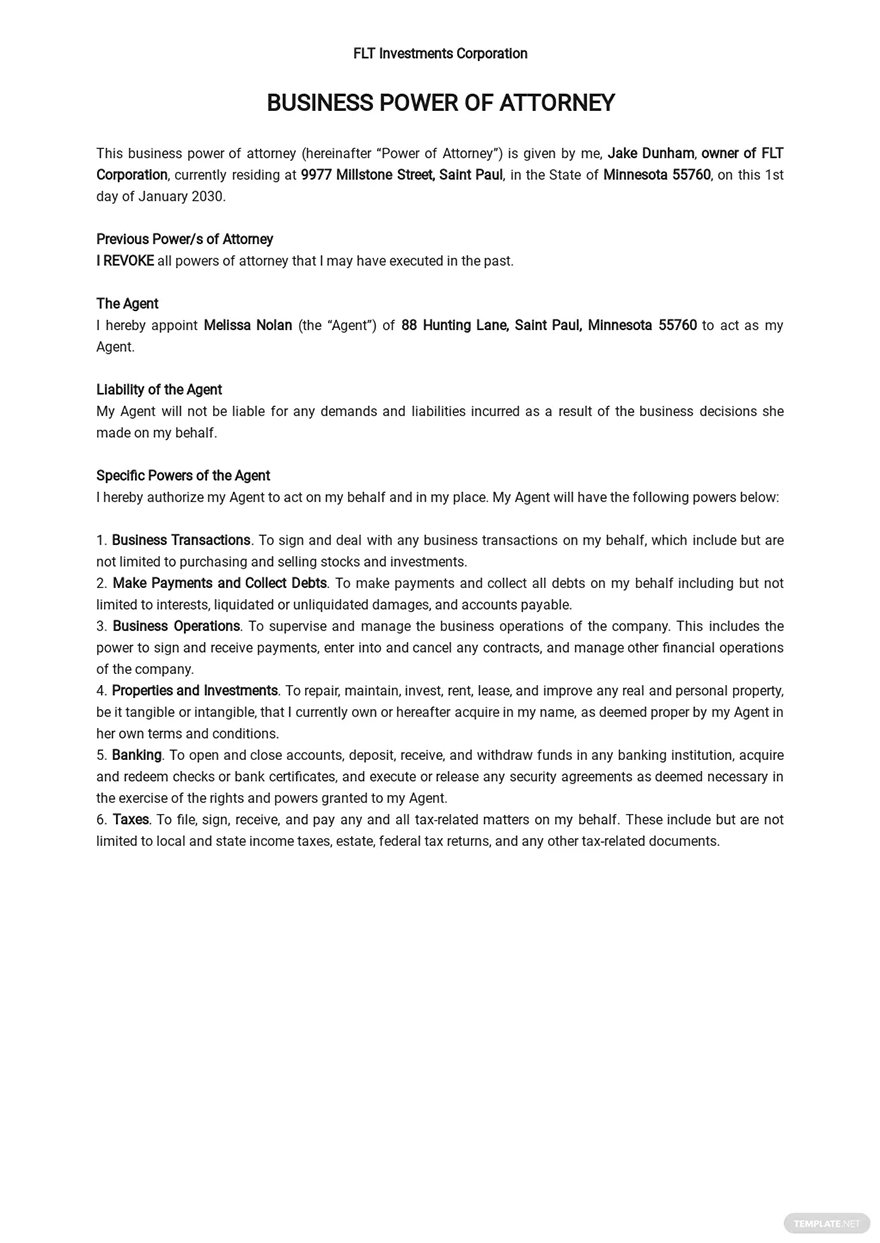
Child Power of Attorney
Child power of attorney is a legal document that parents can use to grant a person or persons the right to care for their child. Power of attorney for a child is a temporary delegation of power that is durable and applicable for parents that cannot commit to taking care of their children for a specific period, lasting up to six months to a year. Through the legal help of a lawyer under a court of law, parents can grant the document to a guardian in cases where parents are incapacitated to act physically, financially, and medically.
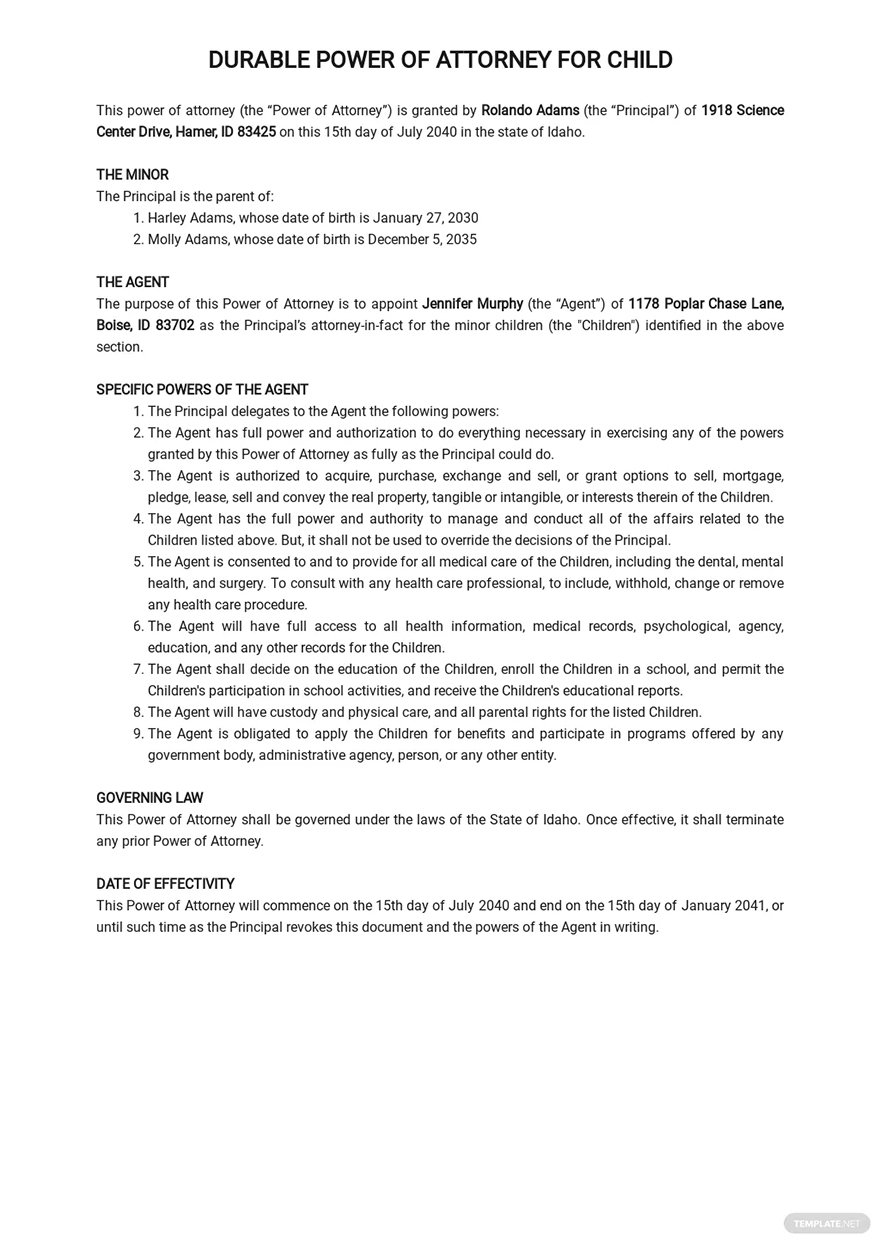
Company Power of Attorney
A company power of attorney, or corporate power of attorney, is a legal document that grants or appoints an individual, committee, council, or another organization to act and sign necessary documents on its behalf. The entity that shoulders the responsibility goes by the corporate attorney that ensures the smooth operations of an organization and handles affairs and transactions when the decision-making body is away, loses the capacity to act, or dies without the finalization of an estate. The company’s power of attorney is necessary if there is only a single director or more than one.
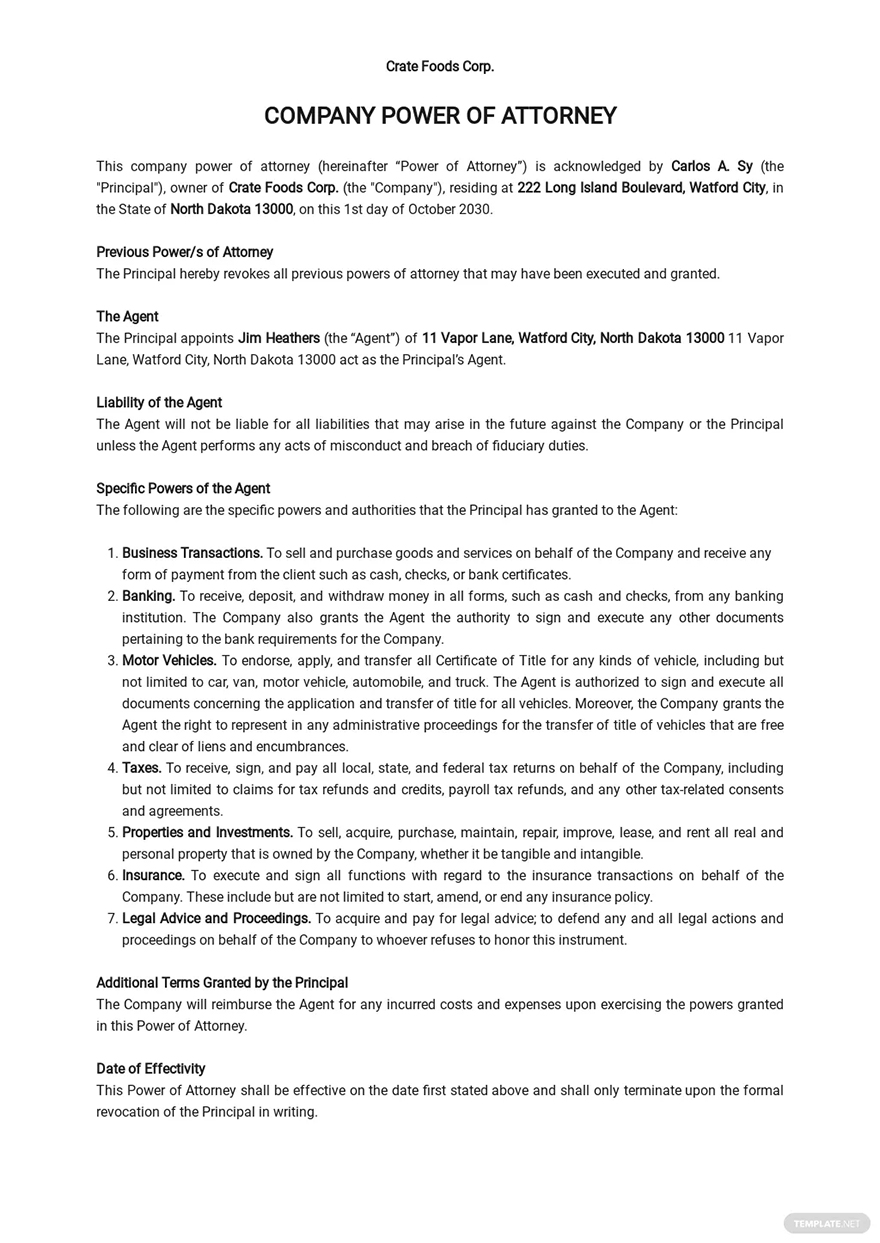
Durable Power of Attorney
When it comes to having a durable power of attorney, it means that the agent assigned by the principal acts on their behalf even if the person becomes incapacitated. Durable powers of attorney prepare individuals to plan for medical emergencies or declines in mental and physical capacity to make rational actions and decisions regarding finances and property, like land, vehicles, or real estate. The document takes effect after a certain situation or period until its revocation.
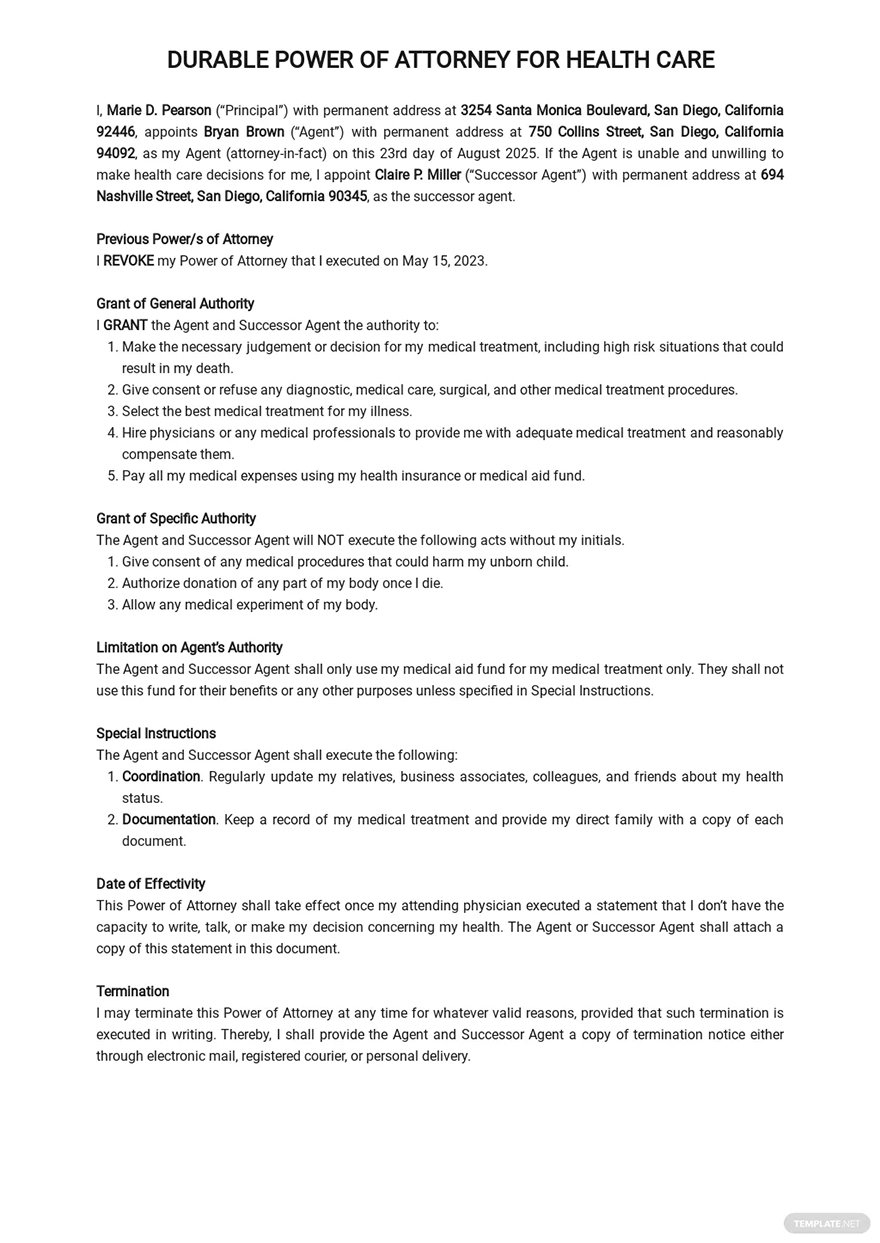
Financial Power of Attorney
Financial power of attorney is a legal document that grants a trusted individual known as an agent the authority to act on a person’s behalf for financial matters, also known as a general power of attorney. The principal can customize the document to be broad or restrictive to only several duties. Through the financial power of attorney, an agent controls the principal’s finances, including taking loans, enabling sales, and conducting and managing financial transactions.
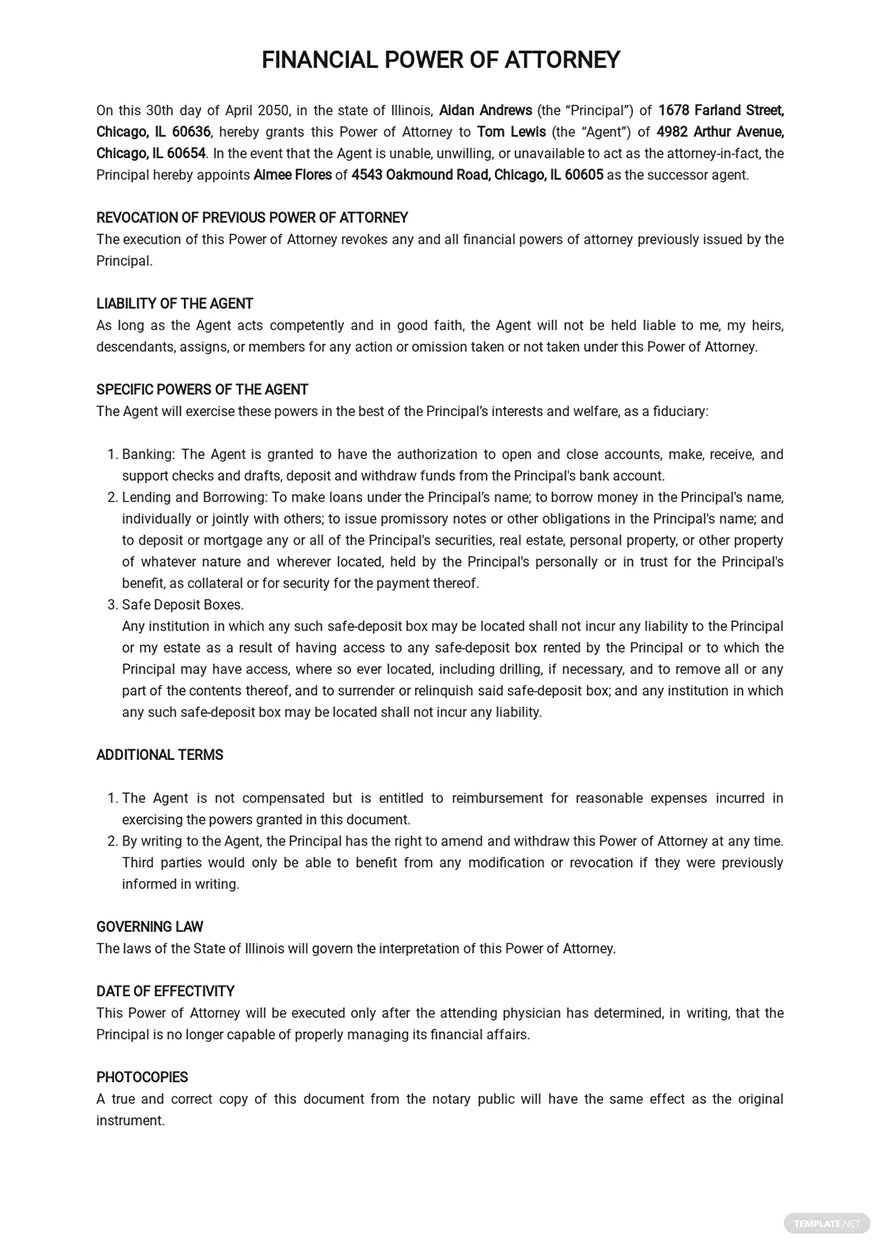
Health Power of Attorney
The health or healthcare power of attorney is a document that focuses on giving an agent or an attorney the authority to make decisions about a person’s daily routine and activities, especially about a person’s health. The health power of attorney provides an individual with the ability to decide and speak with other people regarding medical conditions, treatment, and care. These decisions involve interaction with society, social affairs, specimen testing, and even enduring treatment or operations.
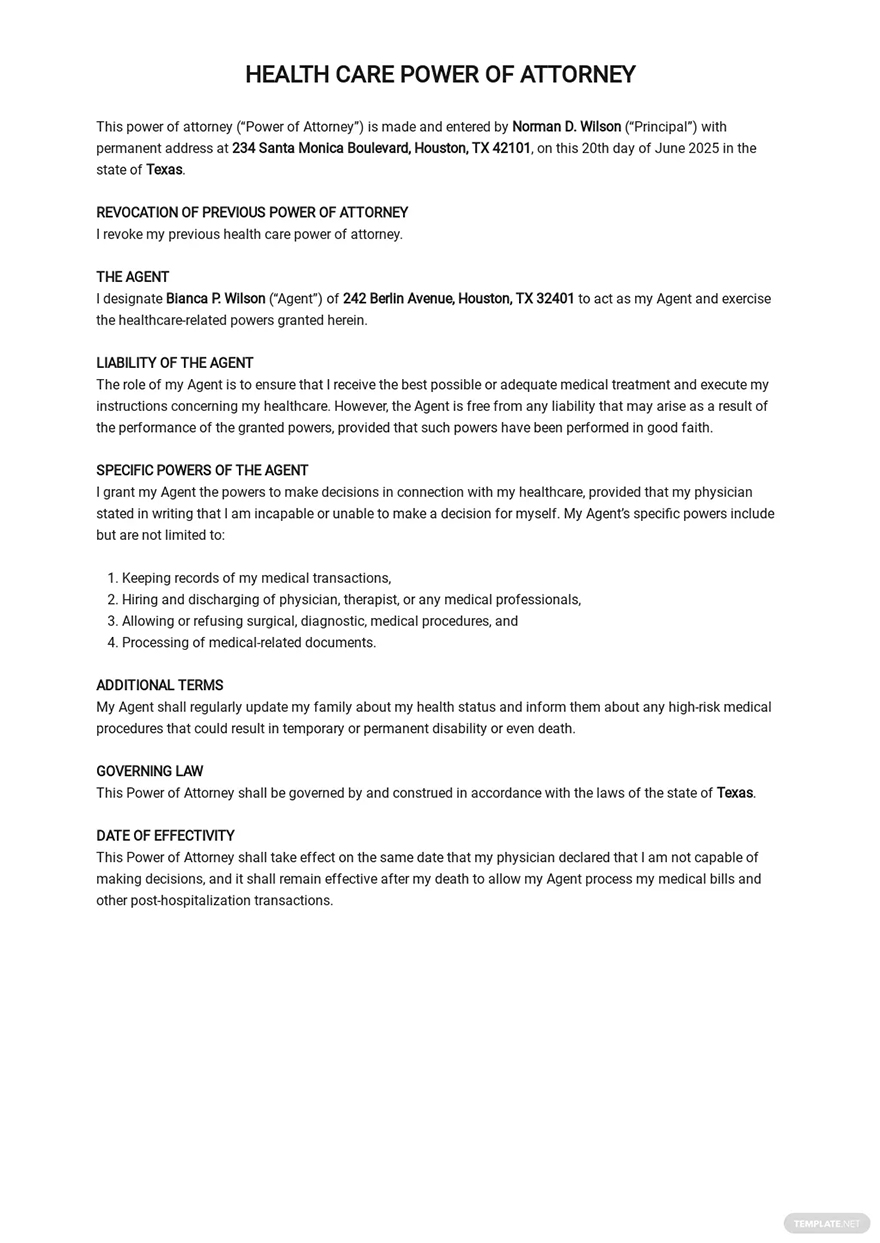
Lease Power of Attorney
Lease power of attorney is a special power or authority that a principal grants an agent to rent out a property, like land, real estate, or vehicle, on their behalf. It is a special power of attorney that allows the agent to act as a consumer that leases or rents a person’s property from a third-party vendor, seller, or landlord in legal terms. There must be a written agreement on paper between the agent and principal, showing their signatures to state facts of instances of using power of attorney.
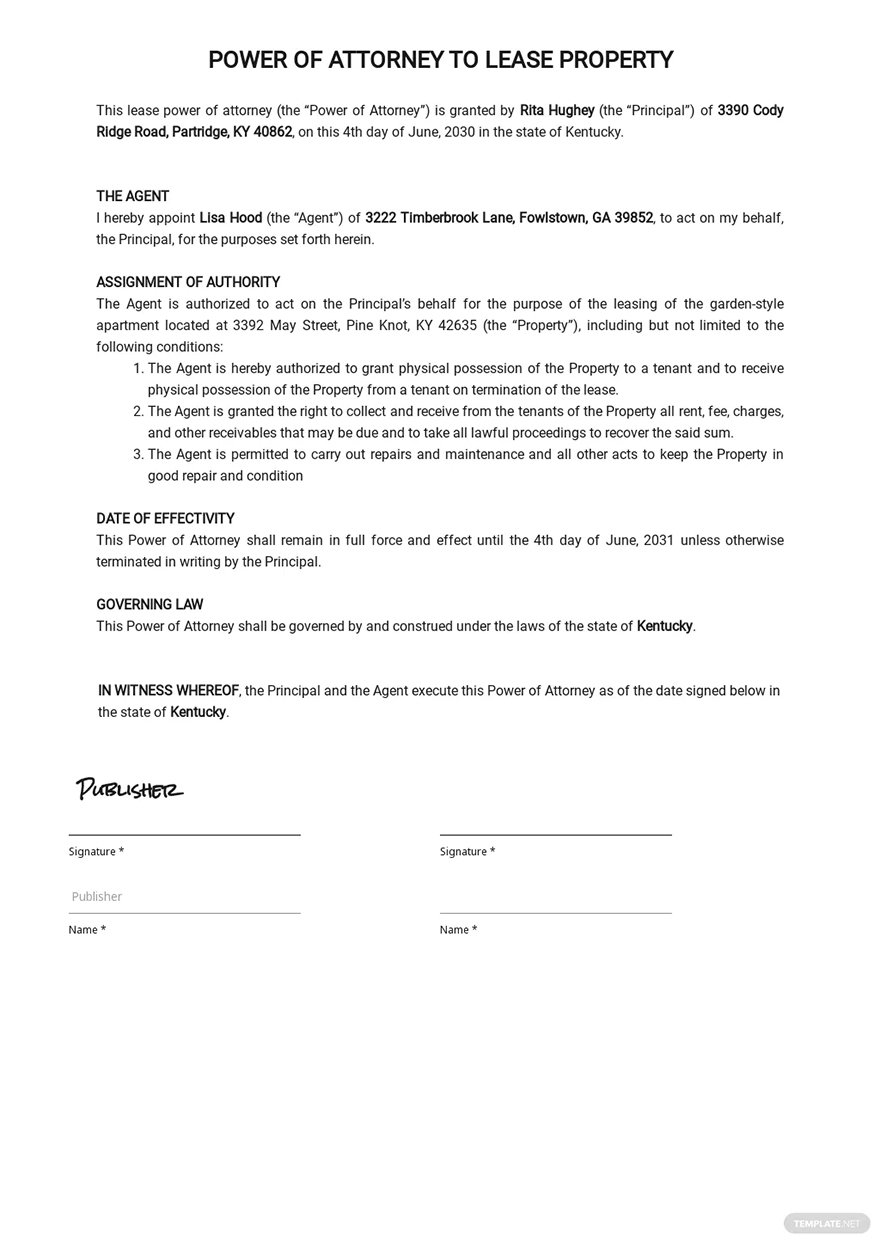
Legal Power of Attorney
A legal power of attorney refers to a document representing the legal authorization of a person, called an agent or attorney-in-fact, from another, called a principal, to act on their behalf for limited, general, or dual application of authority. The document is legally binding and enforceable in situations where the principal cannot act on their behalf due to physical or mental incapability. The legal power of attorney entails an agent to handle legal concerns and matters on the principal’s behalf.
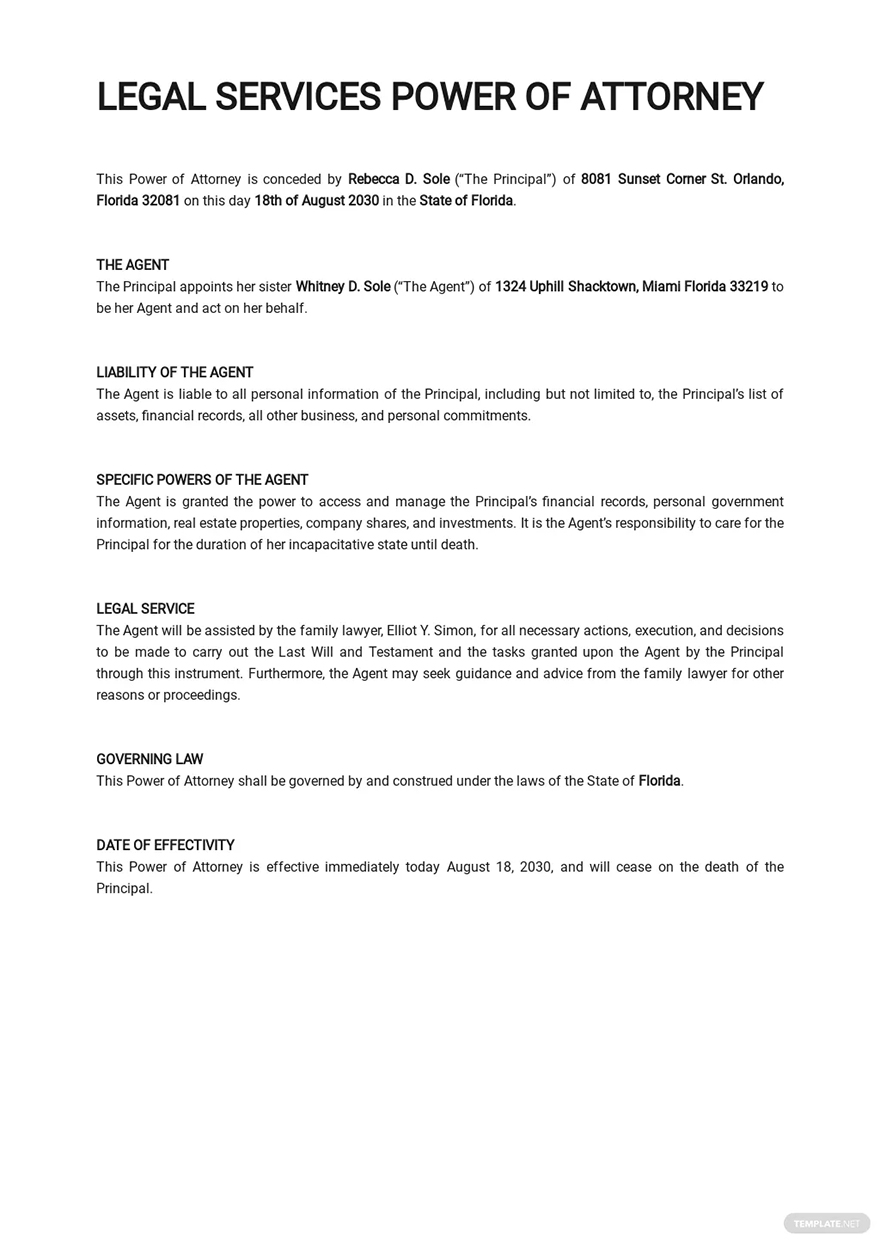
Limited Power of Attorney
Limited power of attorney is a legal document that gives the named person called the agent or attorney-in-fact the legal capability and authority to perform a definite set of actions on behalf of the principal person whose name and signature appear on the document. As the word suggests, a limited power of attorney does not give the agent control and full authority over the principal. Limited power of attorney also goes by the special power of attorney in other cases.
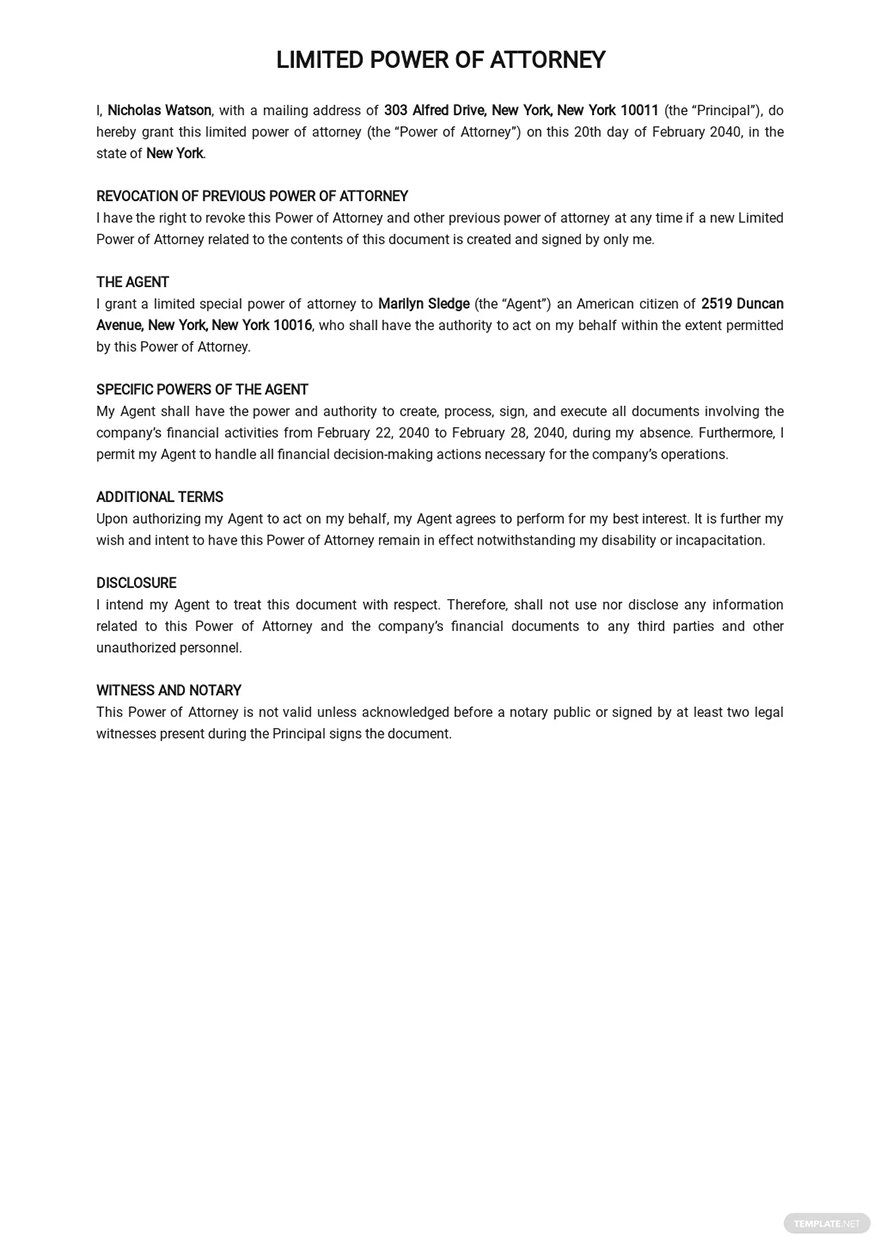
Medical Power of Attorney
The purpose of having a medical power of attorney is to appoint a person as an agent or attorney-in-fact to make significant and relevant medical decisions on behalf of a principal in the case they become ill or incapable of making their own decisions. A medical power of attorney is always durable powers of attorney as they only come into effect if the principal is left incapacitated to act on his own. Principals must select trust-worthy individuals as agents, selecting close family members or friends.
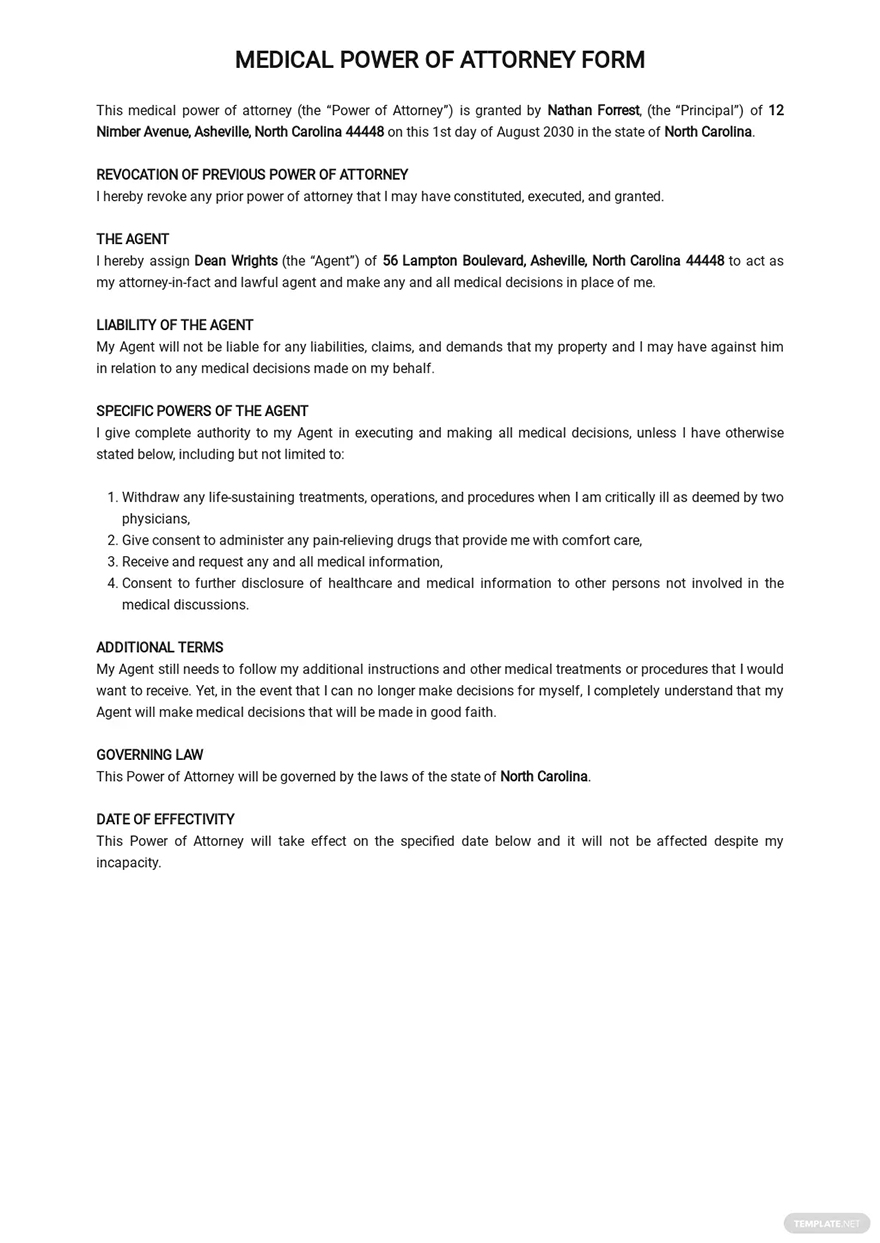
Power of Attorney Purpose, Uses, Importance
Remember that powers of attorney are uncoerced delegations of authority from the principal to an agent or attorney-in-fact to perform various tasks and act on behalf of the principal. In different states, power of attorney documents are unilateral and notary contracts that require the principal’s signature and the agent’s acceptance.
Principal Selects Their Agent
In the case someone prepares a power of attorney, there is a chance that they are ill or incapable of making decisions for themselves. They select and assign an agent with the power to decide on necessary actions. Without a power of attorney, the court appoints an individual as a guardian through an expensive process.
Avoids Guardianship or Conservatorship
People without power of attorney have no choice but to have another person petition for a guardian or conservator. The court of law appoints the individual who will manage the financial, medical, and property affairs of the incapacitated person. Having power of attorney allows the principal to identify their agent.
Provides Discussion Between Family Members
There needs to be ample consideration when creating a power of attorney, and it is best to consult with family members. It is advantageous for parents to discuss the agent’s identity, responsibilities, and opportunities the principal sets in the document. Constructing the power of attorney document leads to discuss wishes and expectations.
Prevents Questions About Intent
A well-written power of attorney eliminates the arguments between family members over the wishes of the incapacitated individual. It also prevents the questions about the principal’s intent to assign a particular person as their agent. After completing the legal document, it serves as viable and concrete evidence of their intent without oncoming disputes.
Prevents Delay in Asset Protection
Power of attorney documents includes all of the powers of an agent in effectively protecting assets through a comprehensive plan. If the power of attorney document does not specify the agent’s actions, it can result in the principal can lose value in their properties. Indicate all the necessary powers an agent performs to carry out their responsibilities.
What’s In A Power of Attorney? Parts?
Title and Type of Power of Attorney
Power of attorney documents falls under two distinct categories, general and special. The power of attorney document must state the category, and the power of attorney title, with the first section displaying the title and document type to demonstrate clarity.
Principal and Agent
A power of attorney must contain comprehensive and accurate information regarding the legal identities of the incapacitated person or principal and the person with authority or the agent. Incorporate other helpful details, including the legality, citizenship, and postal address.
Specific Powers Granted
Another part of a power of attorney document contains a detailed list of actions, authorizations, and powers that a principal grants to an agent. Stating the powers in a general sense allows an agent to perform actions that the principal did not specify in the document.
Execution
After drafting a power of attorney document, the principal and agent affix their signatures for its execution. Witnesses must indicate their signatures in the document, along with the acknowledgment of the notary public, notarizing the document for its legality.
How To Design a Power Of Attorney?
1. Determine the Power of Attorney Size
2. Specify the Purpose of Creating the Power of Attorney
3. Pick the Power of Attorney Template
4. Indicate the Name of the Agent
5. Schedule Discussion Meetings with Family Members
6. Finalize, Sign, and Distribute the Document
7. Update the Document as Necessary
Power of Attorney Vs. Attorney
Power of attorney is a legal document that provides an individual the authority to perform legal and binding decisions for an incapacitated person.
Meanwhile, an attorney is a shortened word for attorney at law, and they are individuals who graduate from law school, pass the bar examination, and are currently practicing law.
What’s The Difference Between Power Of Attorney, Letter of Authority, and Will?
Power of attorney is a legal and notarized document that assigns an individual with authority to perform acts on a person’s behalf due to their incapacity.
A letter of authority is a non-notarized document that specifies a task from one person for another party to perform.
A will expresses a person’s desires, wishes, and expectations of an individual after their passing, taking no legal effect when the person is still alive.
Power of Attorney Sizes
Power of attorney documents is legal and enforceable documents that different individuals use to have the agent’s name in writing, notarizing the paper for lawful and enforceable purposes. Persons must produce and print the copy in standardized paper sizes, following the list of power of attorney sizes below.
- Letter (8.5” x 11”)
- Legal (8.5″ x 14″)
- A4 (8.3” x 11.7”)
Power of Attorney Ideas & Examples
People can maximize the use of the power of attorney documents by selecting whether the agent has general, limited, durable, or springing authority to perform acts on the principal’s behalf. There is various power of attorney ideas and examples that individuals can utilize according to their wishes and expectations.
- Power Of Attorney Ideas and Examples
- Property Power of Attorney Ideas and Examples
- Sale Power of Attorney Ideas and Examples
- Financial Power of Attorney Ideas and Examples
- Vehicle Power of Attorney Ideas and Examples
- Power of Attorney Letter Ideas and Examples
- Power of Attorney Form Ideas and Examples
- Business Power of Attorney Ideas and Examples
- Company Power of Attorney Ideas and Examples
- Lease Power of Attorney Ideas and Examples
- Health Power of Attorney Ideas and Examples
FAQs
What should be included in a power of attorney?
The inclusions of a power of attorney document consist of the title and type of power of attorney, essential information of the principal and agent, a list of granted powers, and the execution.
Why do you need a power of attorney?
Power of attorney is an essential legal document that protects a principal’s finances, real estate properties, interests, and health.
What is a durable power of attorney?
A durable power of attorney is a type of power of attorney that begins upon document signing and stays in effect during the principal’s lifetime unless they initiate the revocation or cancellation.
Who can act as power of attorney?
The person who acts as power of attorney must be trustworthy, reliable, and capable, preferably a spouse, family member, or a close friend.
How to make a power of attorney?
When making a power of attorney, decide the type of power of attorney to use, choose an agent, decide on the amount of authority the agent gets, obtain a POA form, complete the form by incorporating the signatures, distribute the document to its recipients, and edit the content as necessary.
Who should have a power of attorney form?
The agent, medical practitioners, family members, spouses, banks, and government offices received the completed power of attorney form.
What kind of legal authority is granted for power of attorney?
Power of attorney grants the agent the authority to make legal and binding decisions and actions on the principal’s behalf.
What does having power of attorney do?
A power of attorney enables a designated person or an agent to act and decide on another person’s behalf or a principal in the event of incapacitation.
What can a power of attorney be used for?
There are different types of power of attorney that individuals can use, including business, medical, financial, company, lease, health, legal, etc.
What powers are included in a power of attorney?
A general power of attorney allows an agent to act on the principal’s behalf, including opening bank accounts and managing their finances.
